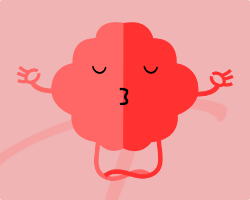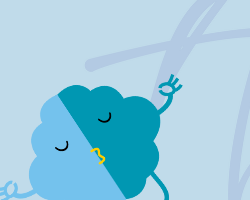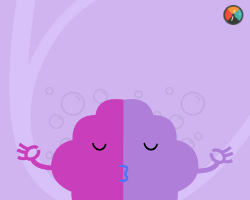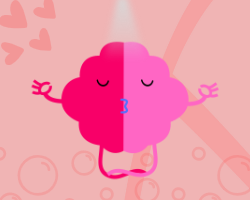Positive emotions include gratitude, satisfaction, inspiration, hope, peace, and curiosity. Studies have shown that positive emotions also help us create resilience, creative thinking, and it helps develop emotional tools that will enable us to thrive later in life.
In her book “Positivity,” Professor Barbara Fredrickson suggests steps we could take in order to increase the presence of positive emotions in our lives. She recommends taking a few moments in a quiet place, where we could reflect on our lives and ask some questions. Ask yourself who are the people, events or actions that make you feel good? Dwell on the positive things in your life, and explain to yourself what are the things that make you feel lucky. By learning these things about yourself, try to increase the activities that bring joy, for example, if you enjoy taking walks, make sure to take a walk at least once a week, even if it’s a short one. Listen to music that you love, share your feelings with those who are close to you, allow yourself to show appreciating for others, and take the opportunity you have to laugh.
Perhaps this idea sounds almost mystical: being able to experience, all at once, feelings of concentration, focus, pleasure, and the feeling that time and space are infinite. This describes what psychologists refer to as “flow”. You might know one or two people for whom work is no longer a place to pass the time but a place where they flourish. You probably won’t be surprised to know that living that way contributes greatly to the quality of life. We experience “flow” when we are able to unite with the task at hand. It could be a creative activity like playing music, drawing, dancing or writing, but it could also be other daily activities like your work, reading, exercising or socializing. The more experiences we have in which we are fully present in that moment, the more we increase our psychological well-being. We become more creative, more focused, and more connected to ourselves and to others.
If you want to increase the dose of flow in your life, check which activities make you feel more present. When you find them, try to integrate them among the other activities you do each day. See what interests you and attracts you, and ask yourself if you are devoting enough time to it. Do not hesitate to reduce the volume of distractions and to adapt the tasks you have to your ability and to the physical condition you are in. This way you can disconnect your cell phone while writing a paper, and adjust the complexity of an assignment to the time of day when you are more alert. Try to do old tasks in new ways, try to use as many of your senses as possible, and practice being present in the moment.
We need relationships as an existential necessity. One of the most influential factors in our happiness is positive and meaningful relationships. Relationships in which we feel that we belong, feel that we are loved, significant and important, thanks to who we are, contribute to our happiness and our sense of security and allow a space from which we can get resilience and inspiration. Positive relationships can be with different people; Our spouses, friends, parents, siblings and colleagues.
Take a moment and try to think who are the people you really like being around with. The ones who understand you, who make you feel valued, who are able to listen and absorb what you have to say. Are there people who make you feel less important or worthy, and upon meeting with them it actually harms your vitality and morale? In which of them do you invest most of your time? After you have figured out who are the positive main characters in your life, begin practicing your listening skills and your empathy toward them. Show appreciation to those who are close to you, spend time with them, and put aside your mobile device when you talk to them. Take an interest in the day of your loved ones, make sure to look into their eyes, and if it feels right for both sides, share hugs generously.
When we ask what the meaning of our life is, we usually mean to find out “why do we do what we do?” or “what is the purpose of all of this?”. Meaning gives us a clear direction and a goal to walk towards. People who have committed to a certain meaning will be ready to overcome various challenges along the way. Parents will be willing to change diapers and take intensive care of a baby who demands attention 24/7, and musicians who are just beginning their career will be willing to perform in a pub in front of a single-digit audience.
Finding meaning is a long and complicated process. Many people are looking for it for a good reason, in different ways. Start by asking yourself what values are important to you, what are the things that are most important to you, and try to understand why you do the things you do today. Don’t be afraid of the question “why?”. Bring it up and see what comes of it. Why do you spend time on certain things? Why do you neglect other things? Why are you found where you are today?
Achievements sound great on paper, but they are very fickle when it comes to our happiness. On the one hand, gaining achievements can make us feel wonderful. This is surely one of the things that miraculously improves self-confidence. On the other hand, the pursuit of achievements can create an unhealthy dependency, and bring stress and disappointment into our lives. James Patterson, an American writer and philanthropist, wrote in his book: “Here is a beautiful picture of a balanced life; You juggle the five balls you call work, family, health, friends, integrity. And now – work is a rubber ball. If you drop it, it will bounce back. The other balls – they are made of glass.” Work has this tendency to find its way into every available piece of time, and the balancing work we have to do is not easy. This does not mean we should be negligent or rest on our laurels. Find the goals that are important to you, and invest your best in them. When talking about achievements it is important to understand that they are personal. For one person a certain result will be a victory, and for another it will be an embarrassment to say it out loud. We live in a very competitive society, and sometimes it seems that we need to successfully complete various tasks, which will prove to us that we are successful. One of the most important questions you could ask yourself is “What do I want to achieve?”
Dr. Seligman looks at the five components of happiness as a set of measured doses that we should maintain. At certain times in our lives, it may be that the relationship component will require more time, thought and investment from us, and at other times we will have to transfer those resources to achievements. He emphasizes that we should keep vigilance and measure our progress. Being able to control the components of happiness is a skill that takes time to develop. The small daily steps you take, the questions you ask, and the arrangement of your schedule and priorities will create a deeper change.
Adopt the following steps on the way to change:
- Find what already works for you (and what doesn’t) – take a look at your existing habits and ask yourself which of them makes you feel bad, which of them suppress your motivation and harm your relationships? Which of them actually improve the quality of your life? Think about where it will be right to invest your energy.
- Measure your progress. Positive steps that you mention to yourself will encourage you to continue, and the falls that you will experience along the way will encourage you to check why they happened.
- Make your mental well-being a priority. Even if you are very busy, you still find time to drink and go to the bathroom. Same thing here. Working on your mental well-being can contribute to you in so many ways that it is simply not worth giving up on.
Here are 31 questions we could ask ourselves, and/or our clients, in order to reflect for them / us the ability to be truly happy.
These questions (and perhaps other questions that come to your mind) will help you learn what is holding you back from reaching self-realization and your desired happiness:
- Are you currently found where you wanted to be at this stage of your life?
- Is there anything you regret not doing as a result of fear?
- How do you manage your difficult emotions? How do you calm yourself down?
- Do you have recurring patterns in relationships?
- Do they cause you to be with suitable partners for you, or unsuitable partners for you?
- In which ways do you make it hard to have a relationship with you?
- Why do you hold onto the goals and ambitions that you have?
- Who or what is preventing you from becoming the best version of yourself?
- What do you look at when you look at yourself in the mirror?
- When was the last time you cried, and why?
- What constitutes simple pleasure for you?
- When do you feel lonely?
- Where do you feel most at home?
- What do people envy in you? Who are you jealous of?
- Who inspires you and influences you in a positive way?
- What would you write a book about?
- Are there any mistakes you keep repeating?
- What do you imagine people say if they gossip about you?
- In what subject do you have a hard time receiving criticism?
- In what ways are you still the person you were as a child?
- In which areas of life are you ok being “just good enough”?
- If you had only one year to live from today, how would you spend it?
- What were you doing the last time you felt that time was sanding still?
- Have you ever sabotaged your own success? And if so, how?
- What do you thank your parents for? And if not, why?
- In what way did you surprise yourself in the last year?
- Are you really capable to forgiving? Who haven’t you forgiven yet?
- Who do you turn to when you need good advice or another perspective on something that concerns you?
- Who is the person who really listens to you? Do you really listen to others?
- Who are the people who bring out your best self?
- What is the nicest thing anyone had ever done for you?
Abraham Maslow's Pyramid of Needs
Abraham Maslow’s, the originator of humanistic psychology, devised a psychological theory in 1951,
named: The Theory of Needs. The pyramid of needs is the basis model of this theory. The theory of needs
analyzes which forces drive a person in his life. It takes a psychological approach that places the person at
the center, and tries to understand what motivates this person and why he or she invests such great efforts
in life in order to achieve and fulfill their desires.
The theory of needs tries to arrange and structure human needs in a hierarchical way in a model called the
“Pyramid of Needs”. The idea is that we all have the same needs that we strive to fulfill during our lives.
The pyramid divides the human needs into different levels, starting from the lowest level to the most basic
needs, such as physical needs, for example, warmth, touch, receiving love, the need to eat and drink, and
up to the high level of needs that is at the top of the pyramid and includes the need for self-realization. A large portion of people do not reach it at all. According to Maslow, it is impossible to fulfill one need without fulfilling the need below it in the pyramid. For example, a hungry person will not be able to focus on studies, work, writing or creation, before first satisfying his basic need to eat.
Here are the five levels of the pyramid of needs:
The first and basic level –physiological needs
Second level – need for security
Third level – need for belonging
Fourth level – need for societal evaluation
Fifth and highest level – need for self-actualization
Love is a biological need
Michelle and Abigail (pseudonyms) are a mother and daughter who come to my clinic once a week after a deep crisis between them.
Abigail, a master’s degree student in psychology, received a class assignment from her professor. He
asked his students to discuss the strengths and weaknesses of their parents in order to learn what they
inherited from their parents, which qualities they inherited that serve them well, and which qualities of
them do not serve them.
According to Abigail, this had opened a Pandora box.
She started thinking about herself as a child and she discovered that she had never received a hug or a kiss
from her mother, as well as any expressions of love. Even though inside she knew that her mother loved her.
Abigail felt empty and sometimes fell into depression.
Michelle (the mother) claimed that this is how she herself grew up, in a home where there were no
expressions of love, and that she is unable to bring herself to express her love.
This case had me returning to read the excellent book “Healing Without Freud or Prozac”
And so writes Dr. David Servan-Schreiber in his book:
“In the last thirty years, depression rates have gradually increased in Western societies. In the last decade,
the consumption of antidepressants has doubled in most developed countries. The emotional brain was created for the purpose of transmitting and receiving through the emotional channel.
It turns out that this type of communication plays an essential role in the survival of the human body, not only food and warmth.
For mammals, emotional contact is a real biological need, similar to food and oxygen. In the 1980s, the progress in intensive care made it possible to keep smaller and smaller premature babies alive.
Inside hermetic incubators with ultraviolet rays, artificial living conditions can be established with the precision necessary for the survival of those small human beings.
It turns out that the sensitive nervous system of those babies had a low tolerance for the contacts
necessary to treat them.
Therefore, they practitioners learned to care for them without physical contact. There were signs installed
on the incubators: “Do not touch”.
The cries of distress heard from the babies, despite the soundproofing of the incubators, touched the hearts
of the nurses, but they ignored them in a disciplined manner for what was asked of them.
But despite the ideal temperature, the perfect oxygen and humidity conditions, nutrition that was perfectly measured, and the ultra violet rays, the newborns did not grow. Scientifically, it was a mystery, almost an insult.













